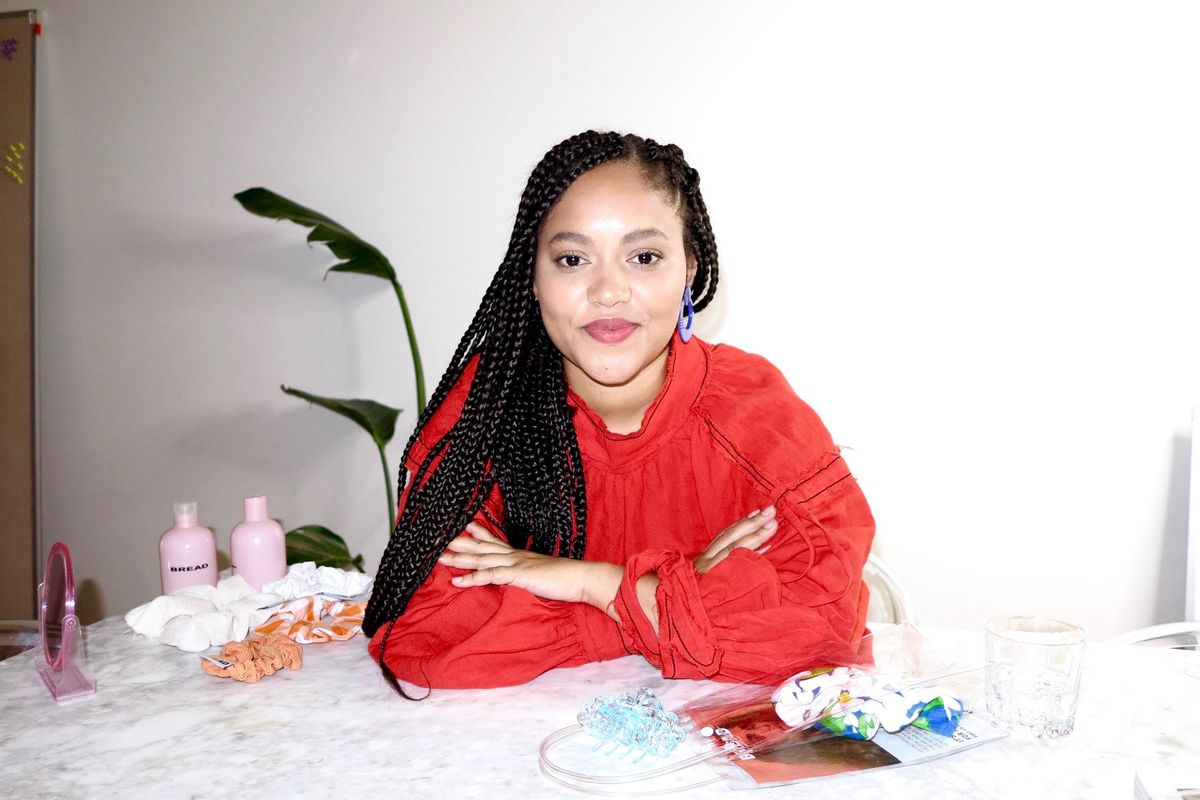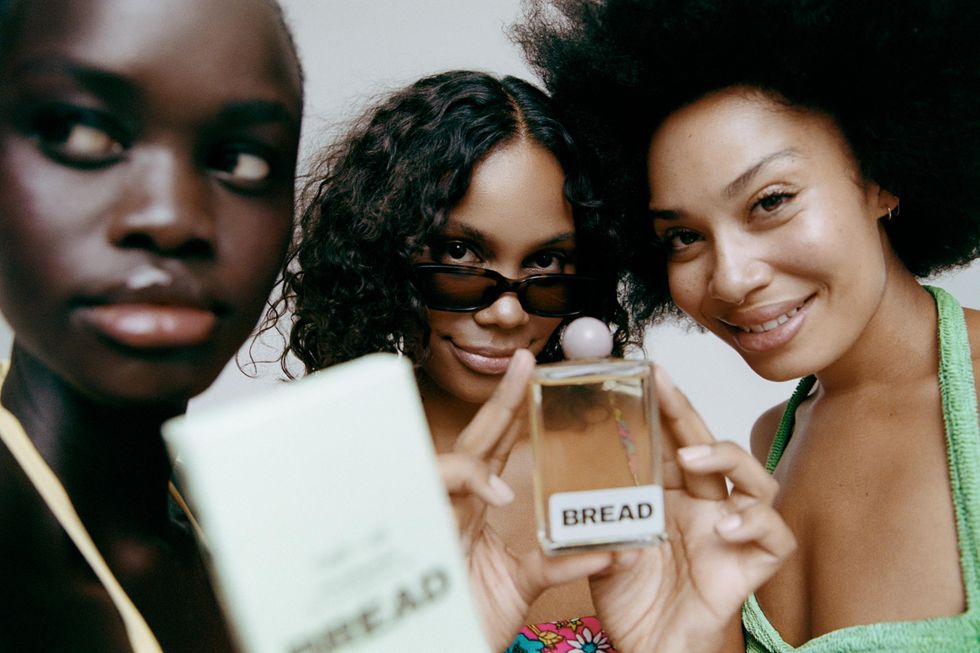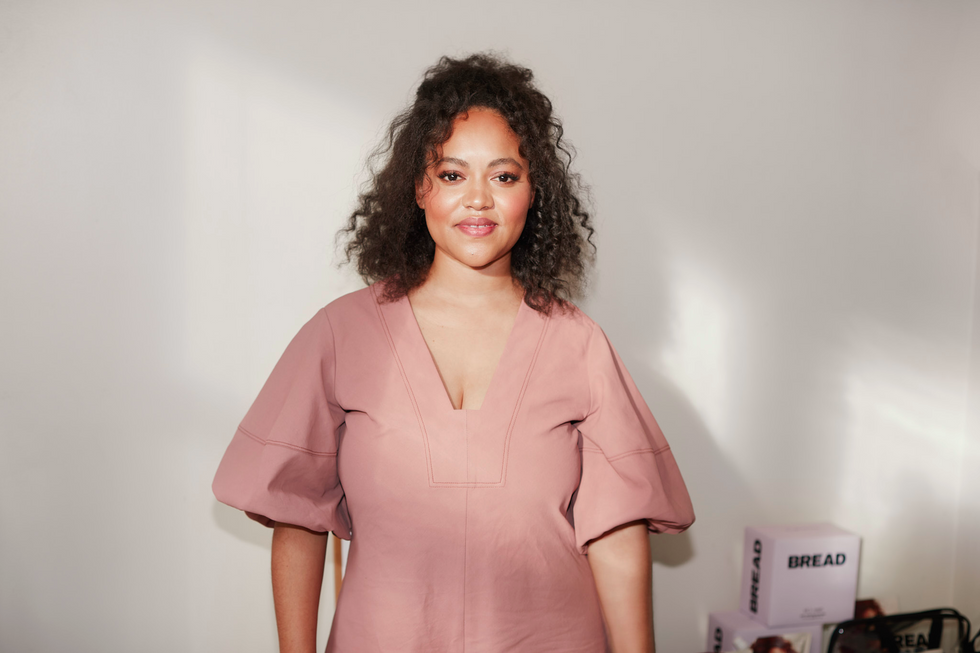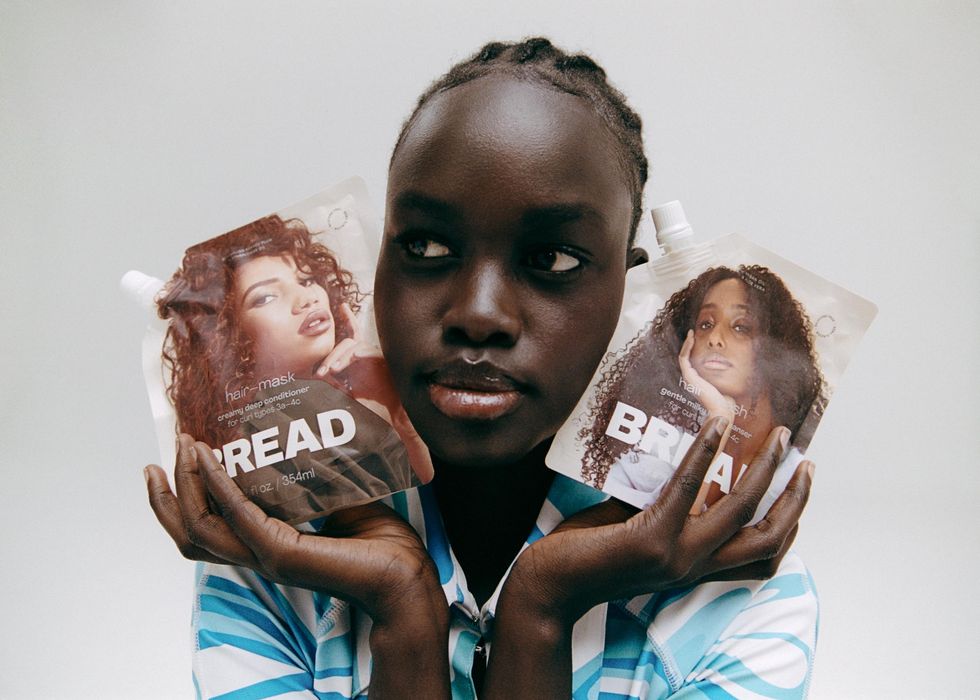Maeva Heim is the Founder the Beauty Industry Has Been Waiting on
The 31-year-old founder of Bread Beauty Supply is changing the conversation around haircare for textured hair.

It's nearing 9 p.m. in Australia, and Maeva Heim is dimly lit from behind and smiling warmly at her computer screen, ready to talk shop. We're here to discuss hair care, namely her brand Bread Beauty Supply, and how black beauty has made the globe smaller.
The 31-year-old is the founder of Bread Beauty Supply, a haircare line that encourages all textures and curl patterns to come as they are. "We don't want to tell you what to do with your hair. Enough people do that already," Heim says of Bread's brand philosophy. "We are just here to provide really good products for whatever you want to do with your hair at any point and not dictate to you how things should be. We're just women making the good products. You're making the good hair, and that's it. We're not here to define the rules."
But it's impossible to talk about recent strides in beauty products for textured hair without talking about the summer of 2020. In the weeks following the murder of George Floyd in the United States, a crescendo of cries rallied through global streets asking for not just equality but equity. The world watched with scrutiny as black boxes filled social feeds and brands made pledges to diversity. Those calls pinged from executive boards to the shelves of some of the world's largest beauty retailers. Meanwhile, after years of formulation, fundraising, and perfecting formulas and ingredients during a global pandemic, Maeva Heim introduced Bread beauty to the world in a perfect storm of timing and execution. The July 2020 launch filled a wide gap for Black beauty between homemade beauty products and behemoth beauty brands as Heim focused on an often under-explored direct-to-consumer middle.
Lauded on social media for their innovative packaging and nostalgic scents (the brand's award-winning hair oil smells like Froot Loops), Bread is a brand that makes hair care basics for not-so-basic hair. Typically, women with textured hair have not been included in the conversations around the idea of "'lazy girl hair" with minimal and effortless maintenance and styling - something Heim wanted to change. Part of Bread's mission is deleting category terms from the brand language – e.g. 'anti-frizz — that the brand feels unnecessarily demonizes characteristics that are natural to textured hair.

Born and raised in Peth, Western Australia, to an Ivorian mother and a French father, Heim grew up as one of the few Black kids in her neighborhood. Her days weaved between school and helping her mother run her braiding salon, one of the only of its kind in 1990's Australia. From sweeping floors, answering phones, and assisting with product orders, Heim's introduction to the world of beauty was rooted in the practice of doing.
Heim would go on to study business and law at Edith Cowan University in Western Australia, before working in marketing at L'Oréal, followed by an internship at Procter & Gamble in Singapore. But it wasn't until her relaxer exploded in her luggage during a flight between New York and Chicago that she began to think seriously about not only her personal hair journey but also about the beauty industry's gaps.
After ditching chemical hair-relaxer and returning to her natural texture, she pitched her idea to Sephora and, in 2019, was selected as one of the first-ever Australian participants in the Sephora Accelerate program, securing a launch deal for both in-store and online.
But what's most striking about Heim, aside from her penchant for focusing on the brand and the consumer, is her focus on the innovation gaps for Black beauty products. Uniquely shy on social media but poignantly focused on every nuance of her brand and serving Bread's prior overlooked customer base, Maeva is the founder the beauty world has been waiting for.
*This interview has been condensed and edited for length and clarity

What are the important things that people would need to know about you to contextualize why you are who you are, and why you do the work that you do?
I was born in Perth, Western Australia. My mum is West African; she's from the Ivory Coast, and my dad is French from France. They migrated here around 1989 and I was born in 1990. I grew up as pretty much the only Black kid in my neighborhood. I've always been in beauty. My mom had an African hair braiding salon here in Perth, in the '90s when I was growing up. It was definitely the only place that you could get braids in Perth, and it was probably one of the first African braiding salons in Australia.
That's where I spent the majority of my childhood, aside from going to school and hanging out with friends. I was at the salon because she dragged me there every weekend and after school. First to sweep floors and take appointments because she had a thick accent, so she didn't like taking appointments, and later as I got older, she would rope me into helping her braid hair. So I spent a lot of time in hair growing up.
How would you describe your brand Bread to someone who isn't at all familiar with the beauty world?
I always liked to say that Bread is like the hair care basics for not-so-basic hair. For a really long time, mainstream beauty has ignored black hair. It's always kind of been this thing that we've had to build ourselves and find our own products and make our own things. But we also spend a lot of money in this space and we're always looking for the right solutions. The reason that Bread exists now is that it is really the time for these needs to be met in the mainstream. Because it is mainstream. Black beauty is mainstream beauty. We should be able to find what we want and what we need for our hair type in the places where we shop our other mainstream beauty items. We are a brand that kind of looks at curls and textured hair and that kind of language a little bit differently. In this space, for a number of reasons, there are a lot of rules around what it means to have naturally curly hair and to have natural hair, and what you can and can't do, and all of those things. And I think for us where a brand that really wants to be in this space as a very soft place to land. No rules. We don't want to tell you what to do with your hair. Enough people do that already. We are just here to provide really good products for whatever you want to do with your hair at any point, and not dictate all extra to you how things should be. We're making good products. You're making the good hair and that's it. We're not here to define the rules.
I do want to dive a little bit into identity here. Do your heritage and identity play into how you approach your work?
I definitely think it does. It's something that I think about more on reflection versus something that I've always thought about. For me, it's that cross-generation identity, where your parents have done things to ensure that you have a life that maybe they didn't have, or that you can have things they weren't able to have. And so there is an absolute sense of duty. It's like don't squander this opportunity and don't squander this privilege that you've been given to be in a space where you have the ability to do something that can give back or help, whether it's your own family or other people. That is definitely where my drive comes from. I didn't spend 20 years of my life watching my mom break her back for seven days a week to not try and repay that. That definitely feeds into it, obviously having that experience in hair and being in that environment, I would not be where I am and starting a haircare brand if it wasn't for that. I hated it at the time. But if I wasn't aware of those brands and those products and surrounded by that, I wouldn't have got to the point twenty-something years later and been like, "hang on a minute, why is it still the same as it was in 1995?" That kind of experience, that unique experience that a lot of people in the diaspora have, is our unique, competitive advantage. That's been really, really formative for me.
We're here to talk about you, but we all start with our mothers, our mothers start with their mothers and so much of what we learn and how we grow comes from watching them. You mentioned your mom was the first person to open a braiding salon in Perth. Did you know at the time that your mother was trailblazing? Or were you kind of like, 'mommy's doing her thing and I've got to sweep the shop?'
It was definitely the latter. It was like, okay, cool. She's doing her thing. On reflection now, I'm like, wow. She started off cleaning hotel rooms and she literally broke her back, so she couldn't do that anymore. And there was just not a lot of work for someone like her who had an accent and who was dark-[skinned] in a place like Perth, where there's not a lot of diversity, even now, but back then, especially, it was very minimal. And so she took what she knew and this skill that she had, that nobody else had, and created something out of absolutely nothing.
Growing up, you said you were one of very few Black women. So where did your personal beauty routine come from? Tell me about your experience with beauty growing up.
Definitely my aunties. We would travel back to the Ivory Coast almost every year when I was younger. I remember I would get there and I would get off the plane and get out of the car and go into the house, and the first thing my auntie would do is sit me down, whip her makeup bag out and do a full face of makeup.
I'm like six years old with bright red lipstick, bright blue eyeshadows, and the thickest eyebrows you've ever seen. And they just loved it. They loved putting makeup on me all the time. And even though the look wasn't what we would go for, it was really an experience of like, okay cool, this is how you use that. This is how you use a brow pencil. This is how you do lipstick. [My auntie] was actually very precise. I feel like there are so many things that my aunts used to do to me that are now trends, like fake eyebrows. Then, I was like, 'this is not good.' And now it's a thing now.
Tell us about the story behind creating Bread. How were you uniquely positioned to enter the beauty market and create your brand?
I ended up working in marketing For some really large beauty brands, and that experience of being behind the curtain, seeing how decisions are made, how products are made and formulated, and how ideas come to life was really beneficial. But it also kind of gave me that impetus to leave and start my own, because I could see that there was this disconnect between ownership and the people on the ground who are actually executing the work and the decisions you are able to make and the change you were able to make. It's a lot harder to change things from within.
I got to the point where I was like, 'I feel like I can have the most impact and I feel like I can create what I think should exist if I go out and do this on my own.' And that was the first step of wanting to leave and create Bread. I actually had no idea at the time what the brand was going to be, it was just very mission-focused, like, okay, these customers banks of Black women are not being served in so many different ways, not just in product on the shelf, but also in the way the brand is presented to Black women as well. And so I wanted to do something about that, knowing that there was work to do everywhere.
This was pre-Fenty as well. So there was also a lot of work to do in the makeup space. It was my desire to do that. Add to this my personal experience of ditching relaxers and seeing what it was like to have my natural texture. When I realized there was this glaring gap where you couldn't find a brand that was really simple, had clean ingredients, could work across all curl types, and that didn't feel like something that my grandma had made on her kitchen counter. There's nothing wrong with that, but also we should have a choice. And there wasn't. There were like 50,000 of those brands and then 50,000 brands that were owned by giant multinational corporations. And I couldn't find anything really cool in between.
You execute packaging in a really clean and modern way. Is that was something that you led with?
That was a big part of what we wanted to create and why I knew, we wanted to launch in mainstream retail and that we would have to raise funds to do it. I wanted to create something that looked really beautiful on a shelf because we weren't seeing that. We weren't getting that. And I think a big reason for that is because there hasn't been a lot of investment in this space. And so, we haven't been given the opportunity to create these things.
But design and the branding and everything about what we do and the way that it looks is a huge part of the brand. We are very intentional about how products look and what we bring to market. We use a lot of glass because it is premium. It's something that you can refill and you can reuse. And it also looks really beautiful on a shelf and we wanted these items to feel really capable and really premium for this space. A lot of what we do are things that I imagined in my mind that I want to exist, then we find people to help make it happen and bring it to life.
That's the beauty of trusting your gut instinct and being aware of the unique value that you can bring to something. Because if nobody's done it yet, maybe nobody's thought about it and sometimes your ideas are really valuable and they are unique, and that's something to always remember, no matter what stage of a company you're at.

What's a myth about Black hair care that you want to debunk with Bread?
Baby hairs. You don't have to lay your baby hairs.
We're not laying edges anymore! If Bread was to have a soundtrack, give me three songs that would be on it.
Okay. I'm going to say Millionaire by Kelis. Wannabe by the Spice Girls. Do you know what else I love? Mya... Case of the Ex.
Ooh. You're breaking up with old haircare.
Yeah, exactly. Nineties pop, reclaiming it all.
For the young female entrepreneurs who are reading this, what is one thing you want them to know about the journey of being a creator and a founder?
Your unique experiences in life will help you create something with value and create something that you love and create something that the world hasn't seen before. Often we can discount our own experiences because we're like, 'oh well, if I had this, or if I had that, then I could do this.' But, don't forget what you do have.
And I think that one thing I find really interesting as well is this idea of networks, right? We all know that who you know will get you this and that, but often, we think about that like you need to know the CEO of this place or these high, hard-to-reach people. But actually, your network can be anybody that. If you are in the diaspora and you know the co-op down the road where they're making Shea butter or they're making some interesting ingredients, that is a huge advantage because having that direct connection to people, no matter what they're doing. That could be what sets your business apart and it could be what's really unique about what you do. Don't discount the network that you do have, even if it doesn't seem like the traditional network that you might think of when you think of networking.
And of course, what's next? Give me the scoop on what's coming next from Bread.
Oh. The 411! So many things. So many exciting things.
Obviously, we're continuing to tackle haircare. Really building out all of the staples that we want to see in that space and then we want to see on everyone's counters. And beyond that, who knows. But right now it's hair. We have a ton of exciting things happening.
I can't reveal too much, but what I will say is that what we have coming next as like our major moment is all around... It's going to be a bit of a quiz. So it's all around something that's missing in the Bread routine right now that would help in that transition phase. If you stop relaxing your hair and you want to go back to natural texture, what's something we're currently missing that would make that transition really, really easy. I'll say that much.







